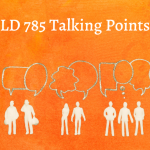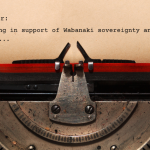The following guest op-ed was published January 14, 2024 in the Bangor Daily News. It was written by Ambassador Maulian Bryant, who serves as President and represents the Penobscot Nation on the Wabanaki Alliance board of directors; Vice Chief Richard Silliboy, who serves as Vice President and represents the Mi’kmaq Nation; Ambassador Osihkiyol Crofton-Macdonald, who serves as Secretary and represents the Houlton Band of Maliseet Indians; Passamaquoddy Tribal Representative, Aaron Dana, who represents the Passamaquoddy Tribe at Motahkomikuk; and Rena Newell, who represents the Passamaquoddy Tribe at Sipayik.
Dr. Martin Luther King Jr. Day is a time we pause to reflect on the great work, words, speeches, acts, lessons, and legacy of the life of a tremendous leader whose life was cut tragically short. This reflection looks different for every single one of us.
For some this is a day to grieve a man who sacrificed his safety and wellbeing and ultimately his life so that the world could be a better and safer place for all. For others this is a day to celebrate the lasting impacts of Dr. King who broke through many barriers and accomplished his mission of bringing about some measure of justice and advanced civil rights for his people. For some that may have no connection to or knowledge about the struggle for people of color in the United States of America this is a day to expand their education and learn about the roots of some of their neighbors and friends in a meaningful way that enhances those interpersonal relationships as well as broader society.
There is no right answer to the question of how to best honor Dr. King. However, there are many good ones.
For us, the Wabanaki Alliance Board of Directors, this day is a chance to think about the powerful themes in the words and actions of Dr. King. We have long shared similar struggles to our African American brothers and sisters and while our fights for justice have differences we can relate to so much about the quest for freedom, equity, enfranchisement, safety, and self- determination.
We can also relate to the harmful, oppressive, and at times violent methods to hurt and marginalize our people.
Something that resonates for us is the way Dr. King expresses the journey from surviving in an unjust system, seeking ways to break out and find relief, facing setbacks and crushing losses in this battle, and finding the fortitude and resilience to have patience and clarity as you push forward. To keep your efforts moving forward even when the barriers loom like giants blocking out any hopeful sunlight.
Dr. King never gave up and along the way he spoke with great eloquence and honesty about how hard the work was and how much of himself he was at risk of losing to it. Yet he kept climbing. He faced the giants. He didn’t back down.
For the Wabanaki people we understand his plight and also his duty he accepted.
The battle we fight didn’t begin in 1980 with the passage of the oppressive and restrictive Maine Indian Land Claims Settlement Act.
It goes back to the 1900s with the theft of our children to be removed from our families and communities and assimilated into abusive foster homes and boarding schools. It goes back to the 1800s with the systemic stealing of our land. It goes back to the 1700s with the bounties placed on our scalps by colonial governments carrying out the wishes of the Crown. It goes back to the 1600s with smallpox on blankets infecting our people and sentencing them to painful and gruesome death and disease.
We remain in our homeland as we have for over 10,000 years. We have faced many giants. And we don’t back down either.
We understand having a history full of horrors and a government that still takes a very long time addressing and repairing their role in it. We empathize with Dr. King and his people, and we join in solidarity in the ways we walk forward seeking justice and truth for all.
We are thankful that in our climb we have made so many good friends and allies and this has advanced our efforts by leaps and bounds. We still seek appropriate recognition of our inherent sovereignty but we are comforted by the fact that as Dr. King famously said, “the arc of the moral universe is long, but it bends toward justice.”







